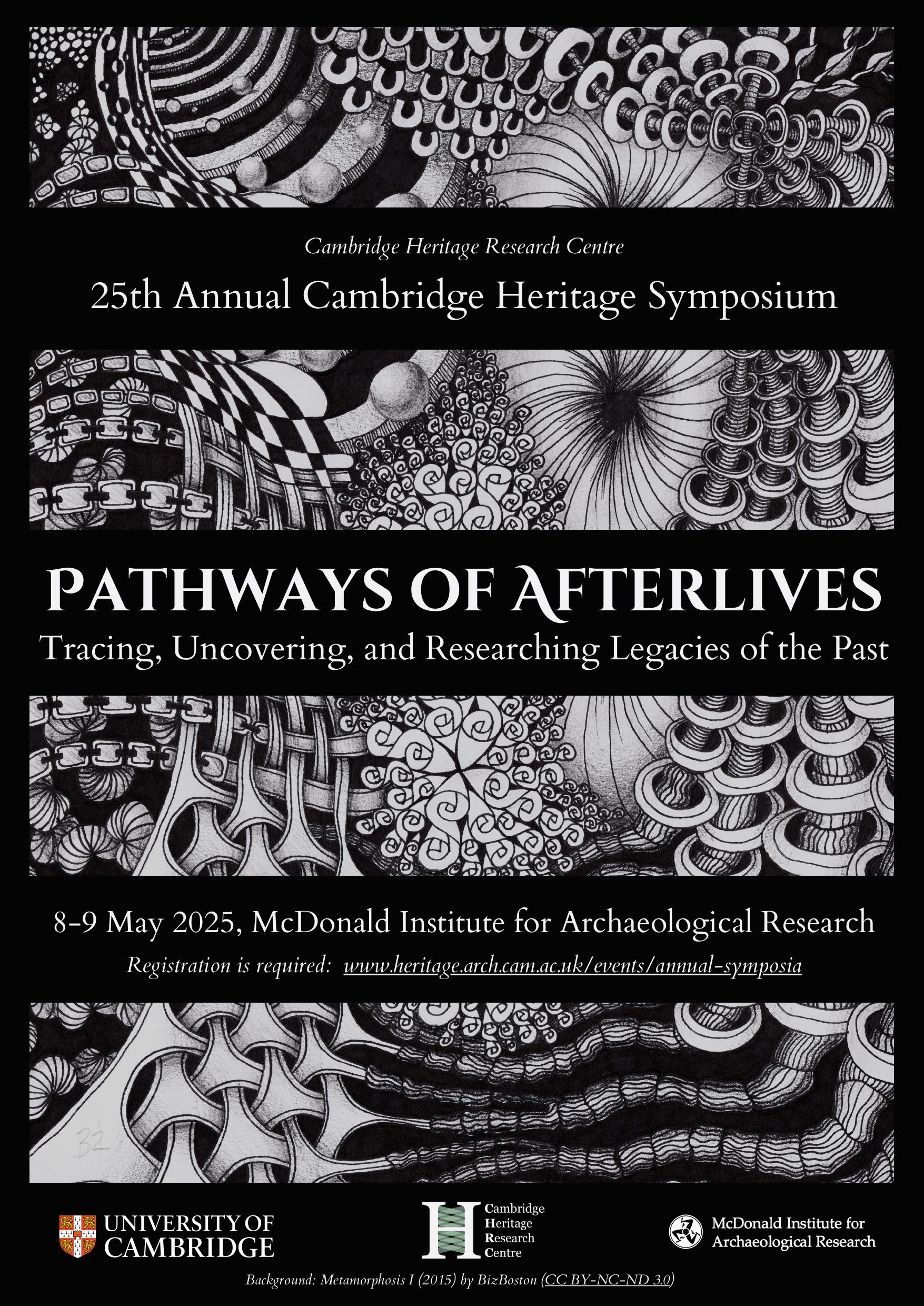
25th Annual Cambridge Heritage Symposium Pathways of Afterlives: Tracing, Uncovering, and Researching Legacies of the Past
8-9 May 2025, McDonald Institute for Archaeological Research
Spots are limited, so please register your interest to attend at this link: https://docs.google.com/forms/d/e/1FAIpQLSdIYNH23Zozbp8-iVxeWIRDuNj1zpOrnAoJmJKjJZJhhZeN6Q/viewform.
Abstract: That heritage involves an interplay between past, present and future is today undisputed in Heritage Studies. We know that past events have shaped the present we inhabit either despite ourselves or due to a deliberate choice or interpretation of a past against which to position ourselves. Yet, determining the continuous causal chains that link the past directly to the present and future has posed methodological challenges. As heritage scholars and practitioners navigate the intersections of memory, history, and identity, there is a growing recognition of the need for innovative and reflexive methodologies to understand and engage with legacies. Despite this, the methodological challenge of tracing, uncovering and researching legacies remains.
The 25th annual Heritage Research Symposium invites researchers and practitioners from diverse disciplinary backgrounds to meet this challenge by contributing to this ongoing discussion, considering how we study the legacies of the past. We seek to both showcase the interdisciplinary research on legacies taking place at the University of Cambridge and bring together cutting-edge work on this topic from around the world. The Symposium will create an opportunity to reflect on innovative approaches, challenge (if needed) existing ones, and exchange experiences on effective methods for researching the complex issues of legacy and heritage across time, space, and culture.
This year’s symposium is funded jointly by a grant from the University of Cambridge’s School of Humanities and Social Sciences (SHSS) for a project entitled Researching Legacies of the Past (PI, Dr Viejo-Rose). The project advances one of the themes of the SHSS’ Research Framework: Legacies of the Past or Historical Transitions by bringing together researchers working on legacies, broadly understood, from numerous disciplines.
Please see the schedule of events
The annual Cambridge Heritage Symposium (CHS) was set up in 1996 as a forum for discussing and sharing ideas, questions, and case studies arising from working with or studying heritage. In short we wanted to provide an opportunity for talking and thinking together around topical issues within the wide framework of heritage studies.
We soon learned that there were additional benefits. Chief among these are the new networks that emerged around each gathering; the opportunity of gaining glimpses into how heritage is debated within diverse fields has been immensely valuable to us as a research community. Another outcome has been the continuous challenge to our own perceptions of heritage studies are (or what they could be), and reflections on the position of this area within both academia and professional practice.
The conferences have been instrumental to recognizing the varied forms of heritage, the wide-ranging interest in the field, and the many ways heritage is being studied and practiced – confirming the centrality of this field and the many areas it contributes to.
From the outset the Symposia have aimed to create an annual forum to bring together students, university and independent researchers, heritage practitioners and managers, to thinking critically and creatively about issues within the field. The themes of the Symposia have varied from exploring ‘Heritage that Hurts’ and ‘Heritage Methodologies’, and topics like the ‘Olympic Heritage’, ‘1914 Re-inherited’, ‘Packaging the Past’, ‘African Heritage Challenges’ and ‘Heritage and Revolution’. Over the years the organisers sought to retain the strong emphasis on discussion, and have aimed at days that focus on learning together.
Previous Annual Heritage Symposia
